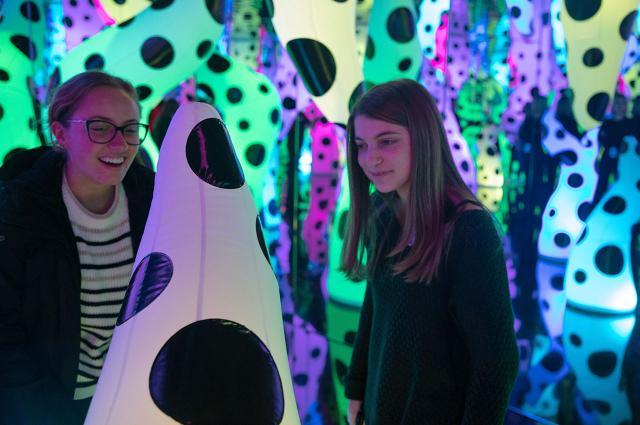Unraveling Craftivism: "The Revolution Is Handmade"

Unraveling Craftivism students Julie Lynch and Ariel Derby experience Yayoi Kusama’s LOVE IS CALLING at the Institute of Contemporary Art Boston.
Throughout history, Americans from all backgrounds have used the power of protest to send a message to the government as well as their fellow citizens. These protest movements are often full of artists and crafters who use their creativity to make meaningful connections to the causes they want to promote.
Delpha grew up in a household that placed a great emphasis on social activism. With her parents meeting on a picket line for the United Farm Workers in the 1970s and their continued involvement in activist movements throughout her childhood, she had an early and in-depth exposure to activism and advocacy. Her educational background in art, art history, and arts administration led her to the "creative learning" environment of the ExCollege. Her time at the ExCollege has resulted in the fruition of several projects, including the ExLab Maker Space, and the creation of Unraveling Craftivism, which was taught for the first time in Fall 2019.
One key question addressed in the class is the difference between "art" and "craft." Through readings and discussions, Unraveling Craftivism students determined that art, historically male and white, is primarily concerned with individual innovation; while craft, often female and more diverse, fosters creative collaboration. The class considered how handcrafts were used to promote political causes during the French and American Revolutions, as well as the history of African American quilting, and the debate surrounding pussy hats.
The goal of the seminar was to create a space where students organically discussed activism and craft history, while creating artwork over the course of the semester. "This class tried to replicate the experience of quilting bees and knitting circles, which have been sites of political discourse throughout history," explained Delpha. Students made pencil sketches of quilt square designs, each with their own personalities and artistic styles. Over the semester, the squares went from pencil to paper collage, to appliqued and embroidered fabric, and were pieced and sewn together into one complex and colorful quilt. Delpha thinks the quilt serves as a metaphor for the class itself. "Everyone has a different point of view and a different set of experiences which they contribute and it makes something greater than the sum of its parts."
The semester was packed with crafts, starting in the second class where students presented a craft piece that told a story about themselves. It culminated in an exhibition at the Tower Gallery in Tisch Library featuring student artwork that explored a range of social and political issues.
Unraveling Craftivism also featured several artist guest speakers, including SMFA professor Anthony Romero, as well as Freedom Baird and Virginia B. Johnson, the co-owner of Cambridge’s Gather Here. During a class field trip to the ICA, students saw a multimedia piece by Anthony Romero as a part of When Home Won’t Let You Stay: Migration Through Contemporary Art, an exhibition dedicated to stories of migration expressed through various craft techniques. Delpha's class ended the visit with a trip to Yayoi Kusama's transcendent installation, LOVE IS CALLING. "It was really interesting to learn about the history of craft and art, and how they can play a role in social movements across time," remarked Julie Lynch, a first-year student.